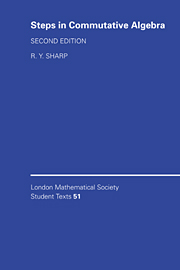Book contents
- Frontmatter
- Contents
- Preface to the 1st Edition
- Preface to the 2nd Edition
- 1 Commutative rings and subrings
- 2 Ideals
- 3 Prime ideals and maximal ideals
- 4 Primary decomposition
- 5 Rings of fractions
- 6 Modules
- 7 Chain conditions on modules
- 8 Commutative Noetherian rings
- 9 More module theory
- 10 Modules over principal ideal domains
- 11 Canonical forms for square matrices
- 12 Some applications to field theory
- 13 Integral dependence on subrings
- 14 Afflne algebras over fields
- 15 Dimension theory
- 16 Regular sequences and grade
- 17 Cohen–Macaulay rings
- Bibliography
- Index
13 - Integral dependence on subrings
Published online by Cambridge University Press: 06 January 2010
- Frontmatter
- Contents
- Preface to the 1st Edition
- Preface to the 2nd Edition
- 1 Commutative rings and subrings
- 2 Ideals
- 3 Prime ideals and maximal ideals
- 4 Primary decomposition
- 5 Rings of fractions
- 6 Modules
- 7 Chain conditions on modules
- 8 Commutative Noetherian rings
- 9 More module theory
- 10 Modules over principal ideal domains
- 11 Canonical forms for square matrices
- 12 Some applications to field theory
- 13 Integral dependence on subrings
- 14 Afflne algebras over fields
- 15 Dimension theory
- 16 Regular sequences and grade
- 17 Cohen–Macaulay rings
- Bibliography
- Index
Summary
Before we are in a position to make the planned applications to dimension theory of our work in Chapter 12 on transcendence degrees of finitely generated field extensions, we really need to study the theory of integral dependence in commutative rings. This can be viewed as a generalization to commutative ring theory of another topic studied in Chapter 12, namely algebraic field extensions.
Let F ⊆ K be an extension of fields (as in 12.1). Recall from 12.21 that an element λ ∈ K is algebraic over F precisely when there exists a monic polynomial g ∈ F[X] such that g(λ) = 0. Let R be a subring of the commutative ring S. We shall say that an element s ∈ S is ‘integral over R’ precisely w.hen there exists a monic polynomial f ∈ R[X] such that f(s) = 0. Our main task in this chapter is to develop this and related concepts. Some of our results, such as 13.22 below which shows that {s ∈ S: s is integral over R} is a subring of S which contains R, will represent generalizations to commutative rings of results in Chapter 12 about field extensions, but these generalizations tend to be harder to prove. (The more straightforward arguments which work for field extensions were included in Chapter 12, as it was thought possible that some readers might only be interested in that situation.)
Indeed, early in the development of the theory of integral dependence, we shall reach a situation where it is desirable to use a variant of what Matsumura calls the ‘determinant trick’ (see [13, Theorem 2.1]).
- Type
- Chapter
- Information
- Steps in Commutative Algebra , pp. 243 - 263Publisher: Cambridge University PressPrint publication year: 2001



